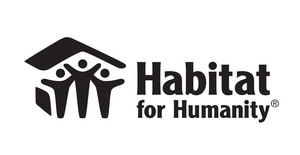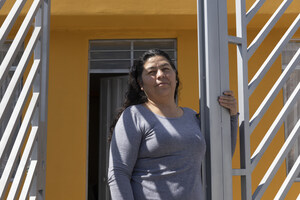One Year After Haiti Earthquake, Habitat For Humanity's Recovery Program Has Benefited Nearly 24,000 Families Through Emergency, Transitional and Permanent Housing Solutions
Work continues toward serving 50,000 families over next five years.
ATLANTA, Dec. 28, 2010 /PRNewswire/ -- Since the devastating earthquake struck Haiti on Jan. 12, 2010, Habitat for Humanity has made steady progress toward its goal to serve 50,000 Haitian families over the next five years.
(Logo: http://www.newscom.com/cgi-bin/prnh/20050501/NYSU020LOGO )
As part of its strategy to provide families with pathways to permanent housing, the organization has constructed more than 1,000 recyclable transitional shelters or upgradeable shelters and expects to have constructed 2,000 by the end of January. Transitional shelters are constructed so they can be dismantled easily and relocated. Upgradable shelters can be turned into permanent homes. For the long term, Habitat remains committed to building hurricane and earthquake-resistant cement-block houses.
In addition, the organization has distributed more than 21,000 emergency shelter kits with partner organizations, conducted more than 2,000 housing damage assessments, and has five fully operational Habitat Resource Centers (HRCs) throughout the country that assess and respond to local community needs. The HRCs offer a range of tailored and demand-driven services such as vocational training, water and sanitation solutions and shelter options. Community leaders provide direct input at every step, from identifying the most vulnerable families to setting priorities for rebuilding.
By accessing services from a Habitat Resource Center, each family moves along a pathway to a safe, secure and affordable permanent home. "As we learned in our work in the aftermath of the Asian tsunami and U.S. Gulf Coast hurricanes, permanent housing is a turning point for many families in getting them on the road to long-term recovery," said Jonathan Reckford, CEO of Habitat for Humanity International. "While there are many challenges in Haiti when it comes to providing adequate shelter, we believe by fostering an unprecedented level of collaboration with other nongovernmental organizations, the Haitian government, local communities and donors, we can help Haitian families improve their housing conditions. This is a long-term process and we are extremely grateful for the support Habitat has received."
The earthquake damaged nearly 190,000 houses in Haiti, of which 105,000 were completely destroyed. Of the more than 2 million affected survivors, 1.3 million are still displaced and living in settlement sites. Since the earthquake, Haiti has been challenged by Hurricane Tomas, a cholera outbreak, post-election unrest, and extreme poverty that existed event before the quake. Access to land with clear title on which to build permanent housing has also been a challenge. To that end, Habitat has been working with the Haitian government and the international community to develop a clear, legal process for owning land and is working with partners to provide emergency technical assistance and capacity support to the government for community planning on shelter and settlement issues.
Despite such obstacles, Habitat's rebuilding activities have benefited nearly 24,000 families or approximately 119,000 individuals. In addition, Habitat and its partners have built more than 200 latrines, distributed 750 household hygiene kits and held hygiene promotion classes to stem the deadly spread of cholera. Habitat is also helping to build long-term economic growth and sustainability by training and employing Haitians to assist in the recovery process. So far, more than 500 Haitians have been trained in seismic resistant construction techniques and more than 200 Haitians have been hired by the Habitat Resource Centers to help in Habitat construction activities.
"In a nation with an unemployment rate of 60 percent, job opportunities are a crucial part of the rebuilding process," said Claude Jeudy, national director, Habitat for Humanity Haiti. "Our Habitat Resource Centers in Cabaret, Leogane, Cap-Haitien, Gonaives and Hinche support the development and sustainability of the local construction sector—as well as economic recovery—with job creation and business development. And they improve the quality of construction to mitigate the effects of future disasters."
About Habitat for Humanity International
Habitat for Humanity International is an ecumenical Christian ministry that welcomes to its work all people dedicated to the cause of eliminating poverty housing. Since its founding in 1976, Habitat has built, rehabilitated, repaired or improved more than 400,000 houses worldwide, providing simple, decent and affordable shelter for more than 2 million people. For more information, or to donate or volunteer, visit Habitat.org.
SOURCE Habitat for Humanity International
WANT YOUR COMPANY'S NEWS FEATURED ON PRNEWSWIRE.COM?
Newsrooms &
Influencers
Digital Media
Outlets
Journalists
Opted In






Share this article